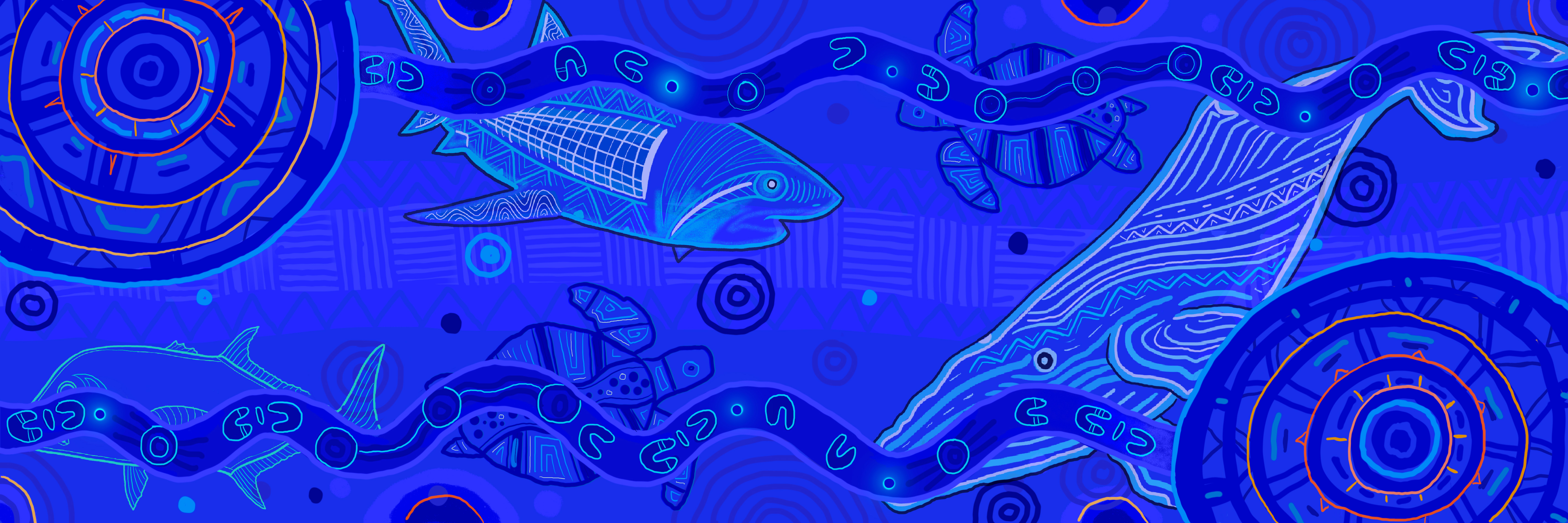Overview
FRDC is dedicated to investing in research, development, and extension (RD&E) to advance the aspirations of Aboriginal and Torres Strait Islander peoples. The FRDC Indigenous Reference Group (IRG) is a committee comprising Aboriginal and Torres Strait Islander people from diverse backgrounds and with expertise across Australian fishing and aquaculture. Established in 2010 after consultations with Aboriginal and Torres Strait Islander communities, the IRG has played a crucial role in weaving Traditional Ecological Knowledge (TEK) and perspectives into Australia’s fisheries and aquaculture sectors. Additionally, the IRG oversees project progress and offers technical guidance to the FRDC on broader issues and initiatives. Beyond direct funding, the IRG has collaborated with organisations such as the Indigenous Land and Sea Corporation, CSIRO, the Department of Climate Change, Environment, Energy and Water, and state and territory governments to support Indigenous-focused research, development, and extension efforts.
Traditional Ecological Knowledge (TEK), held by Aboriginal and Torres Strait Islander peoples, embodies a holistic comprehension of Country, comprising both land and sea, and serves as the cornerstone of life, identity, and cultural values. This connection to land and sea acknowledges the spiritual, personal, and traditional ties of Aboriginal and Torres Strait Islander peoples to their territories, with responsibilities towards ancestral lands and waterways. Traditional fishing rights, supported by legislative changes stemming from Native Title determinations, empower Aboriginal and Torres Strait Islander communities towards economic self-determination.
Australia's aquatic resources have historically sustained Aboriginal and Torres Strait Islanders livelihoods, trade, and cultural practices, and in present times with contemporary relevance and future prospects. Integrating TEK into research projects that look though a lens of adaptive management plans, offers a pathway for economic self-determination, preserving cultural ties to sea Country while generating income.
In reflection of the past fourteen years of dedicated collaboration and progress, FRDC reaffirms its commitment to engagement and empowerment with Aboriginal and Torres Strait Islanders through the IRG. From its inception in 2010 to the present day, the IRG has stood as a beacon of expertise and leadership within the fisheries sector, championing the voices and aspirations of Aboriginal and Torres Strait Islander communities.
Mission and Achievements
Acknowledging Aboriginal and Torres Strait Islander peoples’ profound connection to Country, the IRG is committed to aligning fisheries RD&E with communities’ needs. Highlights of its contributions include:
-
Awareness: Elevating the significance and understanding of Indigenous fisheries needs, markedly boosting RD&E outputs.
-
Strategic Advisory: Offering in-depth advice to the FRDC on Indigenous RD&E, aligning with the aspirations of Indigenous fisheries.
-
Capacity Building: Promoting educational and development opportunities to increase Indigenous participation in fisheries research and management.
Challenges and Strategic Environment
Operating in a multifaceted environment, the IRG navigates strategic, operational, and procedural complexities. Challenges include resource limitations, broader industry engagement, and the integration of TEK. Despite these hurdles, the IRG's contributions are pivotal and recognised across management jurisdictions and the sector.
Strategic Recommendations and Reform Process
A comprehensive external review of the IRG was undertaken by Mr Russell Barnett, the recommendations of which were considered by FRDC and all those within the remit of FRDC were implemented (2022-111 External Review of the FRDC’s Indigenous fishing and aquaculture coordination program). Following this review, the IRG is in the final stages of reforming to enhance its effectiveness and impact. This reform process is guided by strategic recommendations aimed at future success:
-
Collaborative Planning Summit: Initiating a summit (triennial) to define future frameworks for Indigenous fisheries representation, fostering a self-determined, collaborative approach. Providing consistent activities which allow for broader presentation and collaboration with those outside of the FRDC and its processes.
-
Administrative and Procedural Enhancements: Maintaining the IRG’s activities with enhanced administrative support to streamline its advisory roles and research commissioning. This will include a two-tiered consultative structure which allows for a broader reach, improved communication, and stronger opportunity for networking at all levels to funnel information into the IRG and learn from the outputs. It will also provide the necessary structure and governance to deliver the key elements required under the FRDC.
-
Inclusive Organisational Structures: Incorporating Indigenous perspectives into FRDC's organisational structure, acknowledging and reflecting the sector's distinctive challenges and needs.
-
Expanded Representation: Increasing awareness and linkage of the IRG in external Research Advisory Groups to ensure broader representation and adoption of IRG-supported research. The IRG will also actively work on developing linkages with the other FRDC structures in coordination programs and Industry Partnerships agreements.
-
Towards a Representative Body: Supporting relevant activities working towards the creation of a dedicated First Nations Fishing Representative Body, with research initiatives to meet the Indigenous fisheries sector's evolving demands.
Overview of Members
|
Committee Member |
IRG Management Contact |
|
Stan Lui - Executive Officer, IRG (M: 0488 442 678, E: stan.lui@imrca.com.au |
FRDC Management Contact
Joshua Fielding – FRDC Senior Research Portfolio Manager
(M: 0417 324 182; E: josh.fielding@frdc.com.au)
Background documents
- Meet the new IRG members
- Principles and the RD&E Priorities - Overview - Endorsed at the Cairns Forum 2012
- Eleven Key RD&E Principles, Context and RD&E Outputs Endorsed at the Cairns Forum 2012
- FRDC’s Indigenous Reconciliation Statement of Intent and Actions
- Indigenous Reference Group Terms of Reference






